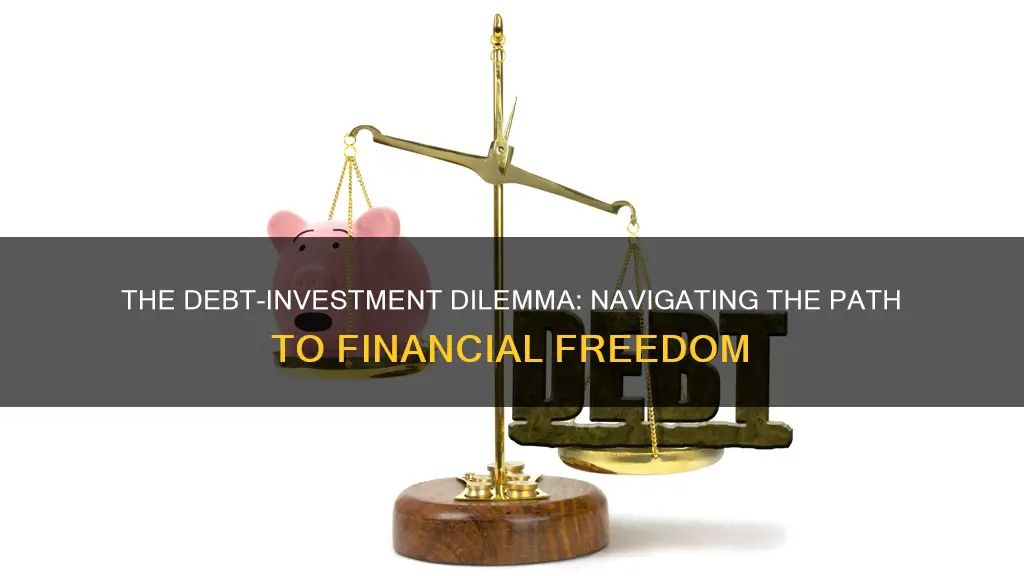
Deciding whether to pay off debt or invest can be a difficult decision, with advantages and drawbacks to both. On the one hand, paying off debt can improve your credit score, increase your cash flow and reduce stress and anxiety. On the other hand, investing can help you diversify your portfolio, take advantage of compounding interest and provide tax benefits.
A good rule of thumb is to pay off high-interest debt first, as this will save you money in the long run. Credit cards, for example, often carry high interest rates, so it's a good idea to focus on paying these off first. If you have multiple debts, it's generally a good idea to start with the one with the highest interest rate and work your way down.
However, it's also possible to do both at the same time. This can be achieved by creating a detailed budget that outlines your income and expenses, and setting clear financial goals.
| Characteristics | Values |
|---|---|
| Interest rate on debt | If the interest rate on your debt is 6% or more, it is generally recommended to pay off the debt before investing. |
| Interest rate on investments | If you can earn more on your investments than your debts are costing you in interest, it may be better to invest. |
| Type of debt | Credit card debt tends to have a high interest rate, so it is often recommended to pay this off first. |
| Credit score | Paying off debt can improve your credit score, which is important if you want to borrow money in the future. |
| Risk tolerance | If you are comfortable with the risk of losing money, you may be more suited to investing. |
| Peace of mind | If debt is causing you stress, there is nothing wrong with paying it off to improve your peace of mind. |
| Retirement | If you are close to retirement, it may be better to pay off debt first. |
| Tax benefits | Student loan interest and mortgage loan interest are tax-deductible, so investing may be preferable. |
| Budget | If you have spare cash in your budget, it may be a good idea to invest it. |
What You'll Learn

Compare the interest rate on your debt with the expected return on your investments
When deciding whether to pay off debt or invest, it is important to compare the interest rate on your debt with the expected return on your investments. This is because interest rates and investment returns can vary, and you want to ensure you are making the most financially beneficial decision.
The interest rate on your debt is the amount a lender charges you for borrowing money, and it is typically noted on an annual basis as an annual percentage rate (APR). The higher the interest rate, the more expensive it is to borrow money. For example, if you take out a $300,000 loan with a 4% simple interest rate, you will pay the lender $312,000, including $12,000 in interest.
On the other hand, the expected return on your investments refers to the potential profit you could make from investing your money. This can include interest or dividends earned on stocks, bonds, or other investments. It's important to note that investment returns are not guaranteed and can vary depending on market conditions and other factors.
When comparing the interest rate on your debt to the expected return on your investments, there are a few things to consider:
- Interest Rate Threshold: If the interest rate on your debt is high, typically 6% or more, it is generally advisable to focus on paying off the debt first. This is because the cost of borrowing money is high, and it may be challenging to find investments with a guaranteed return that exceeds this interest rate.
- Risk Tolerance: Investing carries a certain level of risk, as returns are not guaranteed. When deciding whether to invest or pay off debt, consider your risk tolerance. If you are comfortable with taking on more risk, you may be more inclined to invest rather than pay off debt.
- Investment Timeframe: Consider the timeframe of your investments. If you are investing for the long term, such as for retirement, your investments may have more time to grow and potentially outperform the interest rate on your debt.
- Tax Implications: Interest rates on debt may not be tax-deductible, while investment returns may be subject to taxes. Consider the tax implications of both options when making your decision.
- Financial Security: Ensure you have a solid financial foundation before deciding between investing and paying off debt. This includes having emergency savings, contributing to retirement accounts, and paying off any high-interest credit card debt.
In summary, comparing the interest rate on your debt with the expected return on your investments is a crucial step in deciding whether to pay off debt or invest. Consider seeking advice from a financial professional to help you make the most informed decision for your specific situation.
NBA: Why Fans Don't Invest
You may want to see also

If you have credit card debt, pay it off first
If you have credit card debt, it's generally best to pay it off before investing. Credit cards tend to have high interest rates, and the longer you hold credit card debt, the more interest you'll pay. By paying off credit cards first, you prevent high interest charges from piling up over time.
Credit card debt can also negatively impact your credit score. Your credit score is based on a number of factors, including your credit utilization ratio, which is your debt divided by your total credit. A high credit utilization ratio can lower your credit score, which can then affect your ability to borrow money in the future.
Additionally, credit card debt can be a source of stress and losing sleep over your debts is not good for your overall well-being. Therefore, it is advisable to prioritize paying off credit card debt before investing.
There are a few methods you can use to pay off credit card debt, such as the avalanche method or the snowball method. The avalanche method involves paying off the debt with the highest interest rate first, while the snowball method focuses on paying off the debt with the smallest balance first. Both methods have their pros and cons, and the best method for you will depend on your financial situation and personal preferences.
It is also important to note that while paying off credit card debt is generally a good idea, there are some cases where investing may be a better option. For example, if you have a low-interest credit card and expect to earn a higher return on your investments, investing may be the smarter choice. Additionally, if you are already saving for retirement and taking advantage of any employer matches, you may want to prioritize investing over paying off low-interest debt.
C-Corp: Why Investors Choose This Structure
You may want to see also

If you have an emergency fund, you may want to invest
If you have an emergency fund, you may want to consider investing. This is because investing can be a great way to make your money work for you and build your financial future. However, it's important to weigh the potential benefits of investing against the benefits of paying off any existing debt.
When deciding whether to invest or pay off debt, it's crucial to consider the interest rates involved. Compare the interest rate on your debt to the potential return on your investments. If you can earn a higher return on your investments than the interest rate on your debt, investing may be the better option.
Additionally, it's important to consider your risk tolerance. Investments can be volatile, and there is always the risk of losing money. If you are comfortable with the potential ups and downs of the market, investing may be a good choice. On the other hand, if the idea of losing money keeps you up at night, you may want to prioritize paying off your debt first.
Another factor to consider is your credit score. Paying off debt, especially credit card debt, can help improve your credit score. This can be beneficial if you plan to take out a loan in the future, such as a mortgage or car loan. A higher credit score can also lead to lower interest rates on loans and may even impact other areas of your life, such as insurance premiums or employment opportunities.
Ultimately, the decision to invest or pay off debt depends on your personal financial situation and goals. It may be beneficial to consult with a financial advisor to determine the best course of action for your specific circumstances.
Masternode Investment: Picking the Right Project
You may want to see also

If you have a company pension scheme, contribute to it
If you have access to a company pension scheme, it's usually a good idea to contribute to it. Here's why:
Firstly, a company pension plan is a great way to save for your retirement. It's set up by your employer, who is required by law to offer this benefit and automatically enrol eligible employees. This means that you don't need to take any action to start saving for your future. The contributions are taken directly from your salary before tax, so you save money on taxes, and your employer may also contribute to your pension. This means that by not contributing to your company pension scheme, you are essentially turning down free money.
Secondly, workplace pensions often provide additional benefits beyond retirement savings. For example, your dependents may receive a pension or a lump sum if you die while still employed, and you may be able to access your pension early if you have to retire due to ill health.
Thirdly, joining a workplace pension scheme can give you more control over your investments. With a personal pension, you typically have full control over how your money is invested. However, with a workplace pension, your employer may make investment decisions on your behalf, taking away the stress and time commitment of managing your own investments.
Finally, contributing to a company pension scheme can be a tax-efficient way to save for retirement. As mentioned earlier, contributions are taken from your salary before tax, reducing your tax bill. Additionally, if you are a company director, contributing to your pension via your limited company can further reduce your tax liability.
In conclusion, if you have access to a company pension scheme, it usually makes sense to contribute to it. Not only will you be saving for your future, but you may also receive additional benefits, investment support, and tax advantages. However, it's important to remember that everyone's financial situation is unique, and you should consider seeking professional financial advice to determine the best course of action for your specific circumstances.
February: A Month for Investing?
You may want to see also

If you have high-interest debt, pay it off first
If you have high-interest debt, it is generally advisable to pay it off before investing. Credit card debt, for instance, often carries high interest rates, which can accumulate quickly and prove costly over time. The average interest rate on credit cards is around 20%, according to sources, and in some cases, it can be even higher. By tackling high-interest debt first, you can save yourself from paying hundreds or even thousands of dollars in interest.
Paying off high-interest debt first makes mathematical sense. You can think of the high-interest rate on your debt as a "return" on any payments you make, similar to the return you would earn on a stock market investment. The higher the interest rate on your debt, the more it makes financial sense to pay it off first.
Additionally, paying off high-interest debt can improve your credit score. A low credit score can lead to higher interest rates on future loans and may even impact your ability to secure a loan, housing, or insurance. It can also affect other aspects of your life, such as employment opportunities and insurance premiums.
Furthermore, eliminating high-interest debt can reduce stress and anxiety associated with financial burdens. This can have a positive impact on your overall well-being and allow you to focus on other financial and personal goals.
While investing early is important to take advantage of compounding interest, it is recommended to first pay off any high-interest debt. This will put you in a better financial position to start investing and building your wealth.
Once you have eliminated your high-interest debt, you can then focus on investing and work towards achieving your long-term financial goals.
Current Investment Returns: Impressive or Lackluster?
You may want to see also
Frequently asked questions
It depends on your financial situation and goals. If you have high-interest debt, such as credit card debt, it's generally recommended to pay that off first, as it can cost more over time and cause stress. However, if you have low-interest debt, investing your money may earn you a higher return.
Paying off debt can improve your credit score, increase your cash flow, and reduce stress and anxiety. It can also lower your interest payments and free up money in your budget for saving and investing.
Investing early allows you to take advantage of compounding interest, which can help your money grow faster over time. Investing also offers tax benefits for certain types of debt, such as student loans and mortgage loan interest, which are tax-deductible.
Compare the interest rate on your debt with the expected return on your investments. If the interest rate on your debt is higher, focus on paying that off first. Also, consider your risk tolerance and overall financial goals when making your decision.
Yes, you can adopt a hybrid approach by dividing your income into three buckets: essential expenses, discretionary spending, and financial goals. This allows you to work towards both short-term and long-term financial goals simultaneously.







